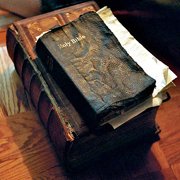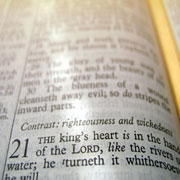

Custom Search
Are we Living in the Last Days...End Times? See Breaking News |
 |
| __________________________ |
 |
________________________ |
| ________________________ |
As You Study the Biblical Last Days in the News... Discover the Bible As Well |
 |
| ________________________ |
 |
| ________________________ |
 |
| ________________________ |
To Know God's Word Read Scripture |
 |
_______________________ |
To Read God's Word Your Reading Schedule |
 |
_______________________ |
 |
| _________________________ |
Thought Provoking Articles for Your Meditation |
 |
_______________________ |
A. Preparation for Preaching |
|---|
Acts 1:1-5 An introduction and prologue are given, providing a link between the two books (Luke and Acts), based on “all that Jesus began to do and to teach”. Jesus showed himself to the disciples and spoke about the kingdom of God. Jesus told them to remain in Jerusalem where they would be “baptized with the Holy Spirit”. |
Acts 1:6-8 Discussion on the end of time: The time or date will remain unknown. Their only job is to witness…to the ends of the earth |
Acts 1:9-11 The Ascension: Jesus was taken up before their eyes, and a cloud hid him. Angels told them to go back to Jerusalem. |
Acts 1:12-26 Replacement for Judas |
Acts 1:12-14 All gathered in the upper room (including women). |
Acts 1:15-26 Peter, acting as spokesperson, explained betrayal of Judas. It was all according to Scripture. Peter recounts the death of Judas. Apostles need to select replacement for Judas. Two men were qualified. Those present prayed and then drew lots. Lot fell upon Matthias (who is never heard from again) |
Acts 2:1-41 The pouring Forth of the Spirit is Seen. |
B. In Jerusalem |
Acts 2:5-13 Other Jews also heard the sound, came to investigate. Each heard the disciples speak in their native language. People were all mystified. Disciples were accused of being drunk. |
Acts 2:14-21 Peter’s first speech. Peter spoke to the crowd, “not drunk” (too early in the morning!). Phenomenon is fulfillment of Scripture (Joel 2:28-32). Joel had prophesied the “pouring out of the Spirit”. |
Acts 2:22-36 Peter connects these events to Jesus. Jesus was the Messiah; ushered in the new age. Jews had put him to death, but death could not hold him. All these events were confirmed by prophecies in the Old Testament. |
Acts 2:37-41 Response of the people: They were convicted in their hearts, cried out to Peter. Peter told them to repent and be baptized 3000 accepted his call, and were added to their numbers that day. |
Acts 2:42-6:7 The Earliest Days of the Church |
Acts 2:42-47 Description of early church: Apostles did many signs and wonders. Followers held all possessions in common. They prayed and broke bread together. Daily they met at the temple courts and praised God. The Lord added to their numbers daily. |
Acts 3:1-26 Healing of Crippled Beggar |
Acts 3:1-10 Healing of the beggar: Peter and John were on their way to the temple, beggar cried out. Peter said, “Silver and gold have I none, but what I have I give to you”. Peter, thru the Lord, healed him on the spot. Beggar jumped up, shouting, praising God, followed them into the temple. |
Acts 3:11-26 Peter’s second sermon: Peter explained the healing as being the work of Jesus (the one they killed). All who were gathered had another opportunity to repent. |
Acts 4:1-31 Arrest and Release of Peter and John |
Acts 4:1-7 Peter and John were arrested. Priests and temple guards arrested them for preaching about Jesus. Still, many people believed…5000 were added to their numbers that day. Next day, Peter and John were taken before Sanhedrin. Asked, “By what power or what name did you do this?” |
Acts 4:8-12 Peter’s response and witness of Jesus: Peter was only too happy to answer (filled with the Holy Spirit). It was by the name of Jesus…the one whom you killed. |
Acts 4:13-22 Release of the apostles…with a warning: Sanhedrin recognized they were unlearned men (making good arguments). Knew they had been with Jesus. Sent them off with a warning never to speak or teach about Jesus. Peter said right away that he wouldn’t be able to keep from talking about Jesus. Nonetheless, Sanhedrin had no choice but to let them go |
Acts 4:23-31 Response of fellow believers: Peter and John joined those gathered for prayer, praising God. After they prayed, house was shaken (evidence of Holy Spirit). They were all filled with Holy Spirit and spoke even more boldly. |
Acts 4:32-5:11 Workings of the Church Community |
Acts 4:32-35 Community shared all possessions in common. |
Acts 4:35-37 Introduction of Barnabas: He sold his field and placed all at the feet of the apostles. |
Acts 5:1-11 Ananias and Sapphira: In contrast to Barnabas, Ananias and Sapphira sold property and kept some of the money for themselves. Peter confronted Ananias. Ananias dropped dead. Peter confronted Sapphira…she lied about the price, also dropped dead. Great fear seized the whole church. |
Acts 5:12-42 Apostles’ Second Appearance Before the Sanhedrin |
Acts 5:12-16 Apostles continued to preach and heal in temple. |
Acts 5:17-33 High priest and Sadducees were very upset, had them arrested again. During the night an angel opened the prison doors and brought them out. Told them to go back to preaching in the temple. Next morning Sadducees called all of Sanhedrin together. Tried to figure out how to handle apostles. Then realized they had escaped and were back at temple, preaching. High priest reminded them he had told them never to preach about Jesus. Apostles reminded him they had to obey God rather than men. High priest and others wanted to put them to death. |
Acts 5:34-40 Gamaliel’s intervention: Gamaliel (Pharisee) recommended they let them alone “If this is from human origin, it will fail; if it is from. God, you cannot stop it.” Brought apostles back in, flogged them, and let them go. Acts 5:41-42 Apostles left rejoicing…they had been worthy of suffering for Jesus. Continued to preach day after day about Jesus. |
Acts 6:1-6 A problem between Greek-speaking Jews and Hebrew-speaking Jews was that Hellenists (Greek-speaking Jews) were being slighted. Widows were being overlooked in daily distribution of food. Apostles (all Jews) gathered community…had them appoint seven helpers (all Greeks). Apostles wanted to devote all their time to preaching. Helpers were to do administrative tasks. Stephen and Philip were among those chosen. |
Acts 6:7 A summary statement is given with respect to growth of the church. |
Acts 6:8-8:3 Stephen’s Ministry |
Acts 6:8-7:1 Opposition to Stephen: Stephen was filled with the spirit, encountered opposition from Jews in synagogue. Opponents brought false charges so Stephen was taken before the Sanhedrin. Stephen had the “face of an angel”. |
Acts 7:2-53 Stephen’s Defense |
Acts 7:2-36 Historical review of God’s intervention in Israel’s life: Abraham, Joseph, Moses, and the exodus from Egypt are recounted. |
Acts 7:37-43 The giving and breaking of the law: Idealizing life in the wilderness is described. |
Acts 7:44-50 Role of the temple: |
Acts 7:51-53 Resistance against the prophets: Transition is seen into their killing of Jesus…the Righteous One. |
Acts 7:54-7:60 Death of Stephen: Sanhedrin was infuriated… a mob-like response resulted. Stephen prayed for their forgiveness (similar to Jesus’ words on cross). Mob stoned him. Saul was there, giving approval to his death. |
C. In Judea and Samaria |
Acts 8:2-3 Great persecution broke out against the church. Saul began finding people (men and women) and putting them in prison. |
Acts 8:4-40 Ministry of Philip |
Acts 8:4-25 Philip and Simon, the sorcerer in Samaria: Philip was very successful preaching and healing in Samaria. Simon, the sorcerer, also believed and was baptized. Upon hearing this success, apostles sent Peter and John to Samaria. They prayed that the Spirit would be poured out on the believers. Simon offered to pay handsomely for their blessings. Peter told him his heart was not right with God. Simon repented, asked for forgiveness. Peter and John returned to Jerusalem, preaching in villages all the way back. |
D.To the End of the Earth |
Philip and the Ethiopian eunuch: The Spirit told Philip to go south; he met Ethiopian eunuch on the way. Eunuch was important official in charge of the treasury of the Queen. He was reading from the book of Isaiah. Philip offered to interpret it for him. Told him all about Jesus. Eunuch asked to be baptized and Philip complied. Each went their way. |
Acts 9-15:35 Towards Asia |
Acts 9:1-31 Conversion of Saul of Tarsus |
Acts 9:1-9 Saul on the road to Damascus: Saul was still on a rampage. Obtained letters to search out Jesus’ followers in Damascus. On the way, a great light flashed around him; he fell to the ground. Voice asked, “Saul, Saul, why do you persecute me?” Identified himself as Jesus. Men with him heard the sound, but could not see anyone. Saul was blind; for three days he ate and drank nothing. |
Acts 9:10-19 Ananias and Saul: The Lord called to Ananias and told him to go to Saul and heal him. Ananias hesitated. The Lord told him Saul was his “designated instrument to carry the Lord’s name to the Gentiles”. Ananias did as he was told. Scales fell from Saul’s eyes; he could see and he was baptized. |
Acts 9:20-25 Saul in Damascus: Saul quickly learned all about Jesus, began to preach in synagogues. After a while, Jews plotted to kill him. Followers of the Way helped him escape…lowered him in a basket outside the wall. |
Acts 9:26-30 Saul in Jerusalem: Disciples were wary of Saul, avoided him. Barnabas took him to apostles, gave him credibility. Saul debated with Grecian Jews; they plotted to kill him. Followers took him to Caesarea and put him on a ship to Tarsus. |
Acts 9:31 Summary statement regarding the growth of the church |
Acts 9:32-12:24 The Beginning of the Ministry to the Gentiles |
Acts 9:32-35 Peter went to Lydda and healed Aeneas. Healed Aeneas, a paralytic for eight years (Similar to Jesus’ healing). Many people in Lydda turned to the Lord. |
Acts 9:36-43 Peter was called to Joppa, healed Dorcas. Dorcas (Tabitha) was a disciple, always doing good and helping the poor. She had died; disciples sent two men to get Peter from Lydda. Peter arrived, put them all out of the room and said, “Tabitha arise” (very similar to Jesus’ statement to Jairus’ daughter). Many people believed. |
Acts 10:1-8 Cornelius had a vision. Cornelius and family were devout God-fearers. Angel appeared to him, told him his prayers had been answered. Angel told him to send for Peter (still in Joppa). |
Acts 10:9-16 Peter had a vision (simultaneous with Cornelius’). Peter was up on the roof (hungry) and while praying fell into a trance. His vision was that heaven opened, a large sheet came down. Sheet was filled with all kinds of animals (clean and unclean). Voice told him to eat, but he declined to eat anything unclean. Twice more the voice commanded him to eat. “Do not call anything God made impure”. |
Acts 10:17-23 Messengers arrived at Peter’s house. Spirit told Peter to go with them. |
Acts 10:23-33 Peter went to Cornelius’ house. Cornelius was waiting with relatives and close friends. Peter recognized it was wrong for him to associate with Gentiles. Then he remembered his vision, no people are unclean either. Cornelius shared his vision with Peter. He asked Peter to tell them everything God commanded him to tell. |
Acts 10:34-43 Peter’s sermon in Cornelius’ house. Told them all about life and death and resurrection of Jesus. Told them Jesus had instructed his apostles to preach to the world. Gave Cornelius message of hope. |
Acts 10:44-48 While Peter was still talking the Spirit came upon all the Gentiles. Peter’s friends who had accompanied him were witnesses to this fact. Peter could see no reason not to baptize them all. In essence, the Spirit had already determined their readiness. All were baptized; Peter stayed there a few more days. |
Acts 11:1-18 Response of church in Jerusalem: Circumcised Jews criticized Peter’s actions when they heard about it. Peter explained what had happened, repeating his vision once again. Peter told how the men arrived at his house, and he went with them. Peter relayed the vision Cornelius had had, how he had spoken to them. He told them about the Holy Spirit being poured out upon them. If God had already chosen them, not to baptize them would be to oppose God. People in the church praised God. |
Acts 11:19-30 The church in Antioch. After some people had become followers of the Way, church authorities sent Barnabas to go there to work. Barnabas remembered Saul and went to Tarsus to get him to help. Barnabas and Saul taught in Antioch for a whole year. |
Acts 11:27-30 Prophet (Agabus) came from Jerusalem to predict a great famine. Church in Antioch sent money to Jerusalem. Apparently Barnabas and Saul went to Jerusalem to deliver the money. |
Acts 12:1-19 King Herod arrested several apostles. He had James put to death and Peter thrown in prison. The church was earnestly praying for Peter. The night before his trial an angel visited Peter. Chains fell off Peter; an angel opened the prison doors and they walked out. Peter was half asleep and didn’t even realize what had happened until they were outside. Peter went to the house of Mary where people were gathered in prayer. Knocked on the door; maid shouted, “Peter is at the door!” Those who were praying thought she was out of her mind. Peter kept knocking; finally they believed her and Peter entered. People were astonished; Peter told them how he had been delivered. Peter left. The next morning, the guards were executed for letting their “prisoner” escape. |
Acts 12:20-23 Death of Herod Agrippa 1 (44AD). According to Luke, he died suddenly in the midst of an audience “Worms ate his flesh”. |
Acts 12:24 Summary: And the word of God continued to increase and spread. |
Acts 12:25-16:5 The First Missionary Journey |
Acts 12:25 Transition statement from Jerusalem back to Antioch. |
Acts 13:1-3 A List of elders and prophets in the Antiochean Church is given. Spirit directed Barnabas and Saul be set aside for mission work. Church placed their hands on them and sent them off. |
Acts 13:4-13 First stop: Cyprus – cities of Salamis and Paphos. |
Acts 13:4-6 Spirit directed their activities. |
Acts 13:7-12 Proconsul and sorcerer. Proconsul wanted to hear word of God; sorcerer opposed this Saul (now Paul) said, “The hand of the Lord is against you!” He predicted sorcerer would be blind…it happened immediately. Proconsul truly believed, praised the Lord. |
Acts 13:13 Left for Perga; John Mark returned to Jerusalem. |
Acts 13:14-52 Arrival at Pisidan Antioch (different Antioch from above) |
Acts 13:14-15 Paul entered the city, went to the synagogue, began to preach. |
Acts 13:16-41 Paul’s sermon at the synagogue in Antioch. Paul began with historical review of Israel’s history. He announced that God had anointed Jesus (descendant of David). Jews had rejected this Messiah Paul cited from Scripture to verify God’s action in Jesus. He appealed to them to believe and repent. |
Acts 13:42-45 People immediately invited them to return the next Sabbath. On that day, the whole city gathered to hear the word of the Lord. The Jews were very jealous, began speaking against Paul. |
13:46-52 Paul clarified policy. He would preach to Jews first and then to Gentiles. Gentiles were elated. Jews incited women of high standing and leading men of the city. They had them thrown out of the city; disciples were filled with joy. |
Acts 14:1-28 Visits to Iconium, Lystra, Derbe and Back to Antioch |
Acts 14:1-7 Paul preached from the synagogue at Iconium. A great number of Jews and Gentiles believed. Other Jews stirred up unbelieving Gentiles. Together, they hatched a plot to stone them. Disciples escaped to Lystra. |
Acts 14:8-20 Ministry at Lystra: Paul healed a man who was lame from birth (Similar to Jesus and Peter). People responded by believing they were gods sent down in human form. Paul and Barnabas did not understand for a while. Priests wanted to offer sacrifices to them Paul and Barnabas stopped the crowd at once. This offered them another opportunity for preaching. Things were going well until Jews from Antioch came and stirred up crowd. People stoned Paul and dragged him out of the city Disciples prayed for him; he was healed, left for Derbe the next day. |
Acts 14:21-28 Ministry at Derbe: Paul and Barnabas won over many converts in Derbe. They began to make their way back through cities they had converted. Sailed back to Antioch, reported on their successes. God had opened the door of faith to the Gentiles. |
Acts 15:1-29 The Jerusalem Council |
Acts 15:1-4 Troublemakers from Judea arrived at Antioch. They preached the need for circumcision. They debated with Paul and Barnabas. The Antioch church sent them to Jerusalem to settle issue once and for all (Luke says the church in Jerusalem “welcomed” them). |
Acts 15:5-12 Peter’s speech: Peter reminded the church of his experience with Cornelius. Paul and Barnabas recounted their experiences with the Gentiles. All felt that all this work was Spirit impelled. |
Acts 15:13-21 James made the final decision. James did not refer to Paul or Barnabas in his speech. James referred to scripture for his decision. Isaiah expected Gentile converts “Therefore we should not make it difficult for Gentiles to join”. He decreed four stipulations: they should refrain from idol meat, sexual immoralities, from things strangled, and from blood. |
Acts 15:22-29 Council sent letter to Antioch with Paul and Barnabas Judas and Silas accompanied them as witnesses to carry the letter. Letter confirmed James’ decision. |
Acts 15:30-16:4 Aftermath of the Council |
Acts 15:30-35 Church of Antioch was delighted. |
Acts 15:36-18:17 Towards Europe |
Acts 15:36-41 Paul and Barnabas parted company over John Mark. Barnabas and Mark (his nephew) left to go to Cyprus Paul and Silas went into Syria. |
Acts 16:1-4 Addition of Timothy: Paul added Timothy to his team. |
Acts 16:5 A summary statement is given. The churches were strengthened and grew in numbers daily. |
Acts 16:6-19:20 The Second and Third Missionary Journeys |
Acts 16:6-10 The Holy Spirit prevented Paul from going into Asia. The Spirit told him to go to Macedonia. |
Acts 16:13-15 Conversion of Lydia (dealer of purple goods). She met Paul at the river, heard his message, and believed. |
Acts 16:16-34 An encounter and aftermath involving demon-possessed girl is described. |
Acts 16:16-18 She followed them for days, shouting they were from the Most High God. Paul finally healed her at which point the spirit left her. |
Acts 16:19-24 Owners of the girl got Paul and Silas arrested. Owners felt loss of income, accused. Paul and Silas. Magistrate had them flogged, thrown in prison. |
Acts 16:25-34 Rescue from prison, conversion of jailor: Paul and Silas spent the night singing hymns. About midnight, an earthquake opened all the prison doors. Jailor thought they had all escaped, planned to kill himself. Paul and Silas stopped him, preached to him. He cared for them, listened to them, and was baptized. |
Acts 16:35-40 Paul revealed he was a Roman citizen. The next morning the magistrates told them they were free to leave. Upon finding out they were Roman citizens, they escorted them out (Roman citizens were never to be publicly flogged – too humiliating). |
Acts 17:1-9 Ministry at Thessalonica: Paul preached successfully in the synagogue. Then the Jews were “jealous” and started a riot against them. They dragged their host, Jason, before the magistrates. Paul and Silas left so Jason wouldn’t be implicated. |
Acts 17:10-15 Ministry at Berea: Bereans received the message eagerly. Jews of Thessalonica followed, agitated the crowd. Paul left by himself to go to Athens |
Acts 17:16-34 Ministry at Athens: Paul preached to the Jews, was overheard by philosophers. Philosophers invited him to speak before the Council of Ares at Areopagus . Paul modified his speech: spoke of God’s nature (not Jewish history). A few were persuaded. |
Acts 18:1-17 Ministry at Corinth: met Priscilla and Aquila. Paul stayed there for 18 months (50-52AD). Silas and Timothy joined him there; Paul devoted all his time to preaching |
Acts 18:12-17 Paul appeared before Gallio Jews stirred up accusations. Gallio dismissed charges because they were of a religious matter. |
Acts 18:18-26 In Asia |
Acts 18:18-23 Paul traveled back to Antioch. First stop was Ephesus, then Caesarea |
Acts 18:24-28 Interlude involving Apollos. Apollos came to Ephesus, was taught by Priscilla and Aquila. |
Acts 19:1-19 Paul’s Third Missionary Journey |
Acts 19:1-7 Paul talked with 12 men who only knew the baptism of John. Paul preached to them; Holy Spirit came upon them. |
Acts 19:8-12 Summary of Paul’s ministry. Preached in Ephesus until some opposed him. Paul rented a lecture hall; spoke there daily for two years “All the Jews and Greeks who lived in Asia heard the word of God”. Paul also did many miracles |
Acts 19:13-19 Seven sons of Sceva. Some Jews were trying to heal in the name of Jesus. Evil spirit turned on them, beat them. When people heard this, they held the name of Jesus in high honor. Burned sorcery scrolls in public ceremony |
Acts 19:20 A summary statement is given: “The word of the Lord spread widely and grew”. |
Acts 19:21-23:35 Journey to Jerusalem and Paul’s Arrest |
Acts 19:21-41 Paul decided to go to Jerusalem. Silversmith (Demetrius) in Ephesus accused Paul of being bad for business. People weren’t buying as many silver shrines of Artemis . He convinced people Artemis would be robbed of her divine majesty. People rioted in Ephesus, gathered at the theater. Disciples prevented Paul from appearing there. Greeks cried, “Great is Artemis of the Ephesians”. City clerk quieted crowd, told Demetrius to use courts to press charges and managed to dismiss crowds. |
Acts 20:1-6 Paul set out for Macedonia after riot. Jews had plotted against him, so he varied his route. |
Acts 20:7-12 Death and the raising of Eutychus: Paul preached at Troas; he talked “on and on”. Eutychus fell out of second story window, was picked up dead. Paul threw himself on the lad’s body and put his arms around him. Paul resumed preaching; Eutychus was taken home alive. |
Acts 20:13-16 Paul intensified his efforts to get to Jerusalem. |
Acts 20:17-38 Paul’s farewell address to the Ephesian elders. Paul spoke to them while in Melitus. Paul encouraged, exhorted, and warned them of things to come Afterward they all knelt together and prayed. They accompanied him to the ship headed for Jerusalem (A highly emotional moment indicative of their esteem for Paul). |
Acts 21:1-16 Disciples warned Paul against going to Jerusalem. Agabus (a prophet) predicted Paul’s imprisonment. Paul would not be dissuaded. |
Acts 21:17-26 Paul’s arrival in Jerusalem: Luke says the “brothers received them warmly”. Jews urged Paul to join with others in making a vow and paying their expenses (This is one hint in. Acts that Paul had brought money from the outlying churches for the poor in Jerusalem). Because of Paul’s encounters with Gentiles, he was ritually unclean. He began purification rites and went to temple to set date for offerings. |
Acts 21:27-36 Paul’s arrest in the temple: Jews from Asia stirred others up, accused Paul of having Gentiles in the restricted area. The whole city was aroused, dragged Paul out of the temple, shut the gates. Commander of Roman troops was alerted because of the commotion; he immediately intervened. Commander ordered that Paul be taken to the barracks. Crowd kept shouting that Paul should be killed. |
Acts 21:37-22:22 Paul spoke to the crowd. Paul alerted the Commander that he was a Jew of Tarsus; he asked to speak to the crowd. Paul recounted his conversion, his blindness, and subsequent healing. He relayed his commission to preach to the Gentiles. The crowd turned on him again, shouting “Away with him!” |
Acts 22:23-29 Paul revealed his Roman citizenship: Commander rescued Paul again, ordered him to be flogged. Paul claimed he was a Roman citizen. Commander was fearful that he might have already harmed him |
Acts 22:30-23:11 Paul spoke before the Sanhedrin: Commander couldn’t understand why Jews accused Paul. He asked Sanhedrin to convene, set. Paul before them Paul argued that he was a Pharisee, believed in the resurrection (Since Sadducees didn’t believe in resurrection, that started a big uproar). Pharisees defended Paul; Sadducees argued against him. Commander had to rescue Paul one more time -- from Sanhedrin this time. That night Paul had a vision saying he would testify in Rome. |
Acts 23:12-22 Jews plotted to kill Paul. Jews contrived with Sanhedrin to lay a trap for Paul. Sanhedrin were to ask to interview him again, he would be assassinated on the way. Paul’s nephew tipped him off about the plot. Paul had him inform the commander (who was worried about Paul’s safety). |
Acts 23:23-35 Commander sent Paul to Caesarea. Commander provided a night escort to Caesarea Wrote letter of explanation to Governor Felix. Commander said he “could find no charge against him” deserving of death. Governor accepted the case and put Paul under guard in Herod’s palace. The governor sent for Paul’s accusers. |
Acts 24:1-26:32 Paul’s Defense In Caesarea |
Acts 24:1-27 Paul before Felix: After five days, High Priest went to Caesarea, laid out charges against Paul by accusing Paul of stirring up trouble all over the world and desecrating the temple. All the Jews agreed with him, asserted these things were true. Paul’s defense is given. He had come to Jerusalem for worship. He had not argued with anyone and they had no witnesses to the contrary. Paul claimed he had brought gifts for the poor (the collection). Paul denied all charges, said those who had accused him were not present. Claimed he was being accused because he believed in resurrection. Felix adjourned the proceedings – issue seemed to be simply a religious matter. He ordered that Paul be kept under guard but given some freedoms. Felix brought his wife to listen to Paul. Two years went by, and then Festus succeeded Felix. |
Acts 25:1-12 Paul before Festus: Festus inherited the case of Paul from Felix Festus went to. Jerusalem (get acquainted visit) and met with high priest. High priest wanted to know his decision regarding Paul. Invited them to return with him to Caesarea to state charges against Paul. Jews went to Caesarea, accused Paul of many things. But again, Jews had no witnesses so they couldn’t prove any of the charges. Paul denied everything. Festus asked if he would go to Jerusalem to stand trial. Paul said he was already in Caesar’s court. Claimed his right as a Roman citizen to appeal his case to Caesar. Festus granted it be done. He wanted to keep peace with Jewish leaders. He was willing to pass off his problem case to Caesar. |
Acts 25:13-22 Festus met with Agrippa II. However, one simply didn’t send an accused man to Caesar without cause. When King Agrippa and his sister came to visit, Festus discussed the matter. Festus thought it was about a religious matter and someone named Jesus. He admitted he didn’t really know how to handle it. Agrippa agreed to interview Paul himself. |
Acts 25:23-26:32 Paul before Agrippa. Festus brought Paul before Agrippa and Bernice. Agrippa gave Paul permission to speak for himself. Paul described his Jewish heritage…impeccable in all regards. Described his conversion experience again. Described his commission and ministry to the Gentiles. Festus interrupted by thinking him insane. Paul refuted this; he said his claims were all true and reasonable. Paul appealed to Agrippa’s knowledge of the prophets. Agrippa asked if Paul thought he could make him a Christian in such a short time. Agrippa said if Paul had not asked to see Caesar, he could have been set free. |
Acts 27:1-28 In Rome |
Acts 27:1-12 The first stop: Crete. Paul was placed in the care of Julius, a centurion in the Imperial Regiment. They set sail late in the season, only to find the winds against them. More time slipped by. Because they couldn’t make much headway, they took cover in Crete. Paul warned them, predicted loss of cargo and possibly their lives. Centurion followed advice of ship owner who wanted to continue journey. Harbor was not safe for winter, so they had to move somewhere anyway. |
Acts 27:13-44 Storm at sea and shipwreck. When the winds changed, they set sail from Crete. Unexpected Northeaster came up, blew them way off course. Sailors threw over much cargo hoping to lighten the load. Paul encouraged them, knowing he would appear before Caesar Fourteen days went by before sailors heard sounds of water crashing against rocks. They had no idea where they were. Sailors tried to escape off ship. Paul had centurion cut ropes holding lifeboats. Eventually ship ran aground, broke up. Sailors intended to kill prisoners; centurion intervened and kept them all safe. All people on board (276) were able to reach land safely |
Acts 28:1-10 Coming ashore at Malta. Islanders showed much kindness to the people from the ship. Paul, in being helpful, was bitten by a viper while throwing logs on fire. Islanders expected him to swell up and die. When he didn’t, they thought he was a god. Paul healed the father of the chief official. Others were also healed; in return islanders gave them supplies |
Acts 28:11-16 Arrival at Rome: After three months, they set sail for Rome “Brothers” from Rome greeted Paul. He was allowed to live by himself, under guard of course. |
Acts 28:17-29 Paul met with Jewish leaders. Paul explained what had happened in Jerusalem. Jews said no one had told them anything, asked to hear Paul’s teachings. Upon hearing what he had to say, many left in disgust. Others listened and were convinced. This only encouraged Paul, affirming his mission to the Gentiles. |
Acts 28:30-31 And for two years, Paul stayed there in his house and welcomed all who came to see him. Boldly he taught the Lord and preached the kingdom of God. |
|
|
© Copyright Nugget Net Review 2013. All rights reserved